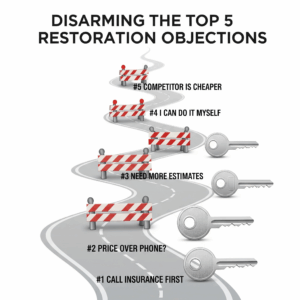“I Need to Call My Insurance First”: Handling the Top 5 Restoration Objections
TL;DR: Key Takeaways
| The Objection | The Core Strategy |
|---|---|
| “I need to call my insurance first.” | Reframe the conversation around their “Duty to Mitigate” damage, which their policy requires. |
| “Can you give me a price over the phone?” | Position an on-site inspection as a professional requirement for an honest and accurate estimate. |
| “I need to get more estimates.” | Acknowledge their prudence, but pivot to the high cost of *waiting* in an emergency situation. |
| “Can’t I just dry it myself?” | Educate them on the “science of drying” and the risks of secondary damage and mold that only professional equipment can prevent. |
| “The other company quoted a lower price.” | Avoid attacking the competitor; instead, build value in your comprehensive, certified process and question what the lower price leaves out. |
You’ve navigated the first five minutes of the call perfectly. The customer is on board, you’ve dispatched a tech, and you’ve arrived on site. Then, they hit you with it: the objection.
What you say next determines whether you book a profitable job or walk away empty-handed after wasting time and fuel.
This is your playbook for handling the most common objections restoration contractors face. It’s not about high-pressure sales; it’s about confidently educating a distressed homeowner and guiding them to the right decision. This is how you help **home service businesses** like yours turn a “maybe” into a signed contract.

The 5 Most Common Objections (And the Scripts to Disarm Them)
Objection #1: “I need to call my insurance agent first.”
This is the most common objection. It comes from a place of fear. The homeowner is worried their claim won’t be covered if they don’t follow the exact right steps.
Your job is to educate them on their “Duty to Mitigate.” Every insurance policy requires them to take reasonable steps to prevent further damage.
The Script: “I completely understand, and you should absolutely notify your agent. In fact, the first thing they’ll want to know is that you’ve already taken steps to mitigate the damage, which is actually required by your policy. Our job right now is to stop the damage from getting worse and professionally document everything for your claim. This will make your call with them much smoother and protect your claim.”
…This will make your call with them much smoother and protect your claim, especially when you can provide them with the kind of bulletproof digital documentation that gets claims approved quickly.
Objection #2: “Can you just give me a price over the phone?”
This is a request for a shortcut, but one that is unprofessional and dangerous for both parties.
The Script: “To be a true professional and give you an honest, accurate price, I need to see the extent of the water migration with my own equipment. Any price I give you over the phone would just be a guess, and that wouldn’t be fair to you. Our on-site inspection is free, and it allows me to give you a firm, detailed estimate you can rely on.”
Objection #3: “I need to get two more estimates.”
In a planned project, this is smart. In an emergency, it’s a costly delay.
The Script: “That’s a very smart approach for a planned project, and I’d do the same thing if I were remodeling my kitchen. For an emergency like this, the biggest cost isn’t the repair; it’s the cost of *waiting*. Every hour this water sits, the damage spreads and the risk of mold growth increases. Let’s authorize the emergency water removal now, and we can work directly with your insurance on the approved scope and pricing they’re comfortable with. The pricing is standardized using the same software most adjusters use.”
Objection #4: “Can’t I just dry this myself with some fans?”
This objection comes from underestimating the enemy: water.
The Script: “That’s a great question. While household fans are good for moving air, they can’t remove the deep, trapped moisture from materials like drywall and wood. We use specialized commercial dehumidifiers and air movers, along with moisture meters, to follow the science of drying. This ensures your property is dried completely to IICRC standards, which is the only way to prevent secondary damage and dangerous mold growth.”
By understanding and **tracking your sales data**, you can identify which objections are most common in your market and train your team to handle them with confidence.

P.S. Don’t let a simple objection cost you a $5,000 job. Master these scripts, build your confidence, and close more deals. A great lead deserves a great closing process.
Frequently Asked Questions About Sales Objections
What is the most common objection in restoration sales?
The most common objection is “I need to call my insurance agent first.” The best way to handle this is to agree with them but educate them on their policy’s “Duty to Mitigate,” explaining that taking immediate action to stop further damage is required and will help, not hurt, their claim. **Real Time Lead Gen** focuses on leads so urgent that this conversation becomes easier.
How do you handle price objections in an emergency?
You handle price objections by shifting the focus from the repair cost to the *cost of waiting*. Explain that in a water damage emergency, delays lead to more extensive damage (like mold), which is far more expensive to fix. Reassure them that you use industry-standard pricing software that is accepted by insurance companies, and focus on getting the immediate problem solved.
What is the “Duty to Mitigate”?
The “Duty to Mitigate” is a provision in virtually every property insurance policy that requires the policyholder to take reasonable steps to prevent additional damage after a loss has occurred. For water damage, this means removing standing water and starting the drying process as soon as possible to prevent mold and structural issues.
Should I ever give a restoration price over the phone?
No, you should avoid giving a firm price or “guesstimate” over the phone for water mitigation. The true scope of damage is impossible to know without a professional on-site inspection using moisture meters. Providing a phone quote is unprofessional and often leads to disputes with the customer later when the actual cost is different.
150 E 10th St
Bloomsburg, PA 17815
(570) 634-5885
justin@realtimeleadgen.com


